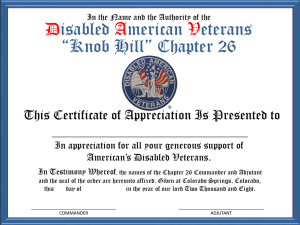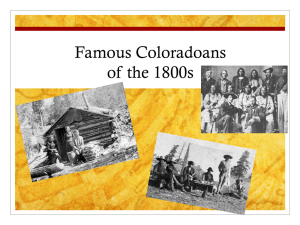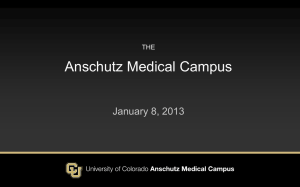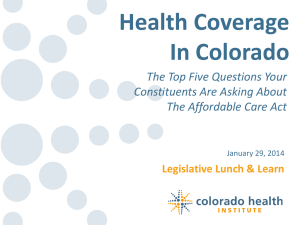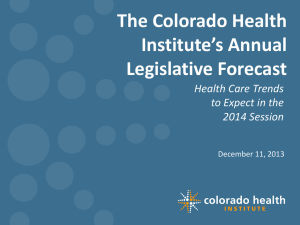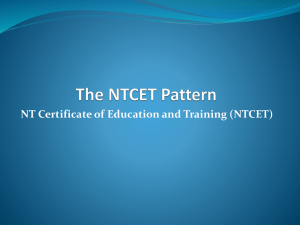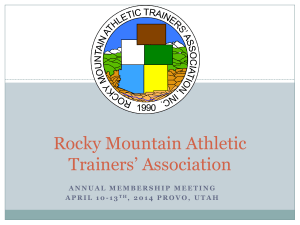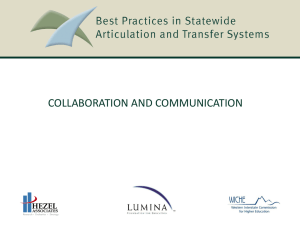Transfer Articulation in Colorado
advertisement
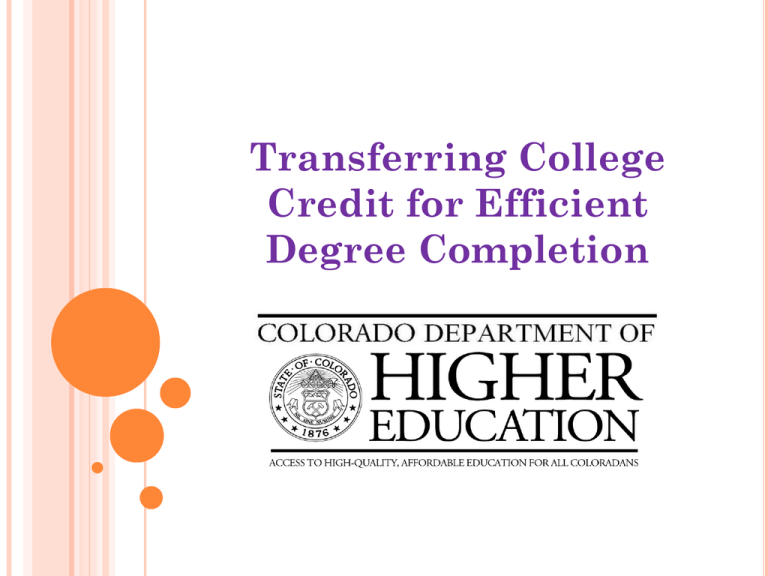
Transferring College Credit for Efficient Degree Completion Today’s Goal Assist individuals who advise students to better understand the transfer pathways available toward degree completion. Components of Transfer Articulation in CO: gtPathways Curriculum Statewide Transfer Articulation Agreements Inter-institutional & Regional Agreements Transfer Guides Statewide Transfer Policy (currently being revised & clarified) Competency Testing & Prior Learning Assessment 2 gtPathways Curriculum – 31 Credits Cr. Categories 6 Written Communication GT-CO1: Introductory Writing course (minimum 3 credits) GT-CO2: Intermediate Composition (minimum 3 credits) GT-CO3: Advanced Writing Course (minimum 3 credits) 3 Mathematics GT-MA1 15 Arts & Humanities – at least 2 courses GT-AH1: Arts and Expression GT-AH2: Literature Humanities GT-AH3: Ways of Thinking GT-AH4: World Languages (must be Intermediate/200 level or above) History GT-HI1 – at least 1 course Social & Behavioral Sciences – at least 1 course GT-SS1: Economic or Political Systems GT-SS2: Geography GT-SS3: Human Behavior, Culture, or Social Frameworks 7 Natural and Physical Sciences GT-SC1: course with required laboratory (1 required) GT-SC2: lecture course without laboratory 3 gtPathways Curriculum: Not in Every Degree All AA & AS degrees contain the entire 31-credit gtPathways curriculum. BUT Not all BA & BS degrees contain the entire 31-credit gtPathways curriculum. 4 gtPathways Curriculum: Not in Every Degree 1. gtPathways “maps” best to Liberal Arts & Science degrees. All LAS degree programs are required to have the gtPathways curriculum available to their students. [CCHE Performance Contracts, Addendum B.] 2. Other degree programs (with additional requirements) might have a different Gen Ed core. 3. Not all courses in an institution’s Gen Ed core are gtPathways-approved. [gtPathways courses should be noted as such in the catalog.] 5 Difference between gtPathways and an Institution’s Gen Ed Core MSU Denver Core Written Communication (6) gtPathways GT-CO# & # (6) CU Boulder LAS Core Written Communication Lower div.(3) + Upper div.(3) Oral Communication (3) Quantitative Literacy (3) Arts and Humanities (6) Historical (3) Natural and Physical Sciences (6) Social and Behavioral Sciences I (3) Social and Behavioral Sciences II (3) GT-MA1 (3) GT-AH# & # (6) GT-HI1 (3) Historical Context (3) GT-SC1 & # (7) Natural Science (13) United States Context (3) GT-SS# (3) + one more AH, HI or SS (3) Contemporary Societies (3) Global Diversity (0-3) (33-36) Quantitative Reasoning & Math (3) Literature & the Arts (6) Ideals & Values (3) (31) Human Diversity (0-3) *Can be met with a GT-SS course. (40) 6 http://www.msudenver.edu/advising/facultystaff/generalstudiesrequirements/ http://www.colorado.edu/ArtsSciences/students/undergraduates/core_curriculum.html Difference between gtPathways and an Institution’s Non-Liberal Arts & Sciences “Gen Ed Core” gtPathways B.S. Electrical Engineering at UCB GT-CO# & # (6) *no upper division at CCCS Approved upper-division writing (6) GT-MA1 (3) GT-AH# & # (6) GT-SS# (3) GT-HI1 (3) + 3 more credits NOT EQUIVALENTS Lower-division humanities/social science (9) *no upper division at CCCS Upper-division humanities/social science (6) GT-SC1 & # (7) General science elective (3) 7 31 24 http://www.colorado.edu/catalog/2013-14/content/electrical-computing-and-energy-engineering BACHELOR DEGREES THAT DO NOT CONTAIN GTPATHWAYS Institution Degree Adams State University Nursing, BSN Colorado Mesa University N/A Colorado School of Mines All degrees. Colorado State University N/A CSU - Pueblo N/A Rationale Curriculum needs to follow standards mandated by CO State Board of Nursing and Commission on Collegiate Nursing Education (CCNE). CSM’s engineering degrees have core course requirements that are very different than the traditional Liberal Arts & Sciences core of courses, after which gtPathways is modeled. CSM’s core is tightly tied to the technical STEM degrees it offers and does not “map” well to the structure of the gtPathways curriculum. 8 BACHELOR DEGREES THAT DO NOT CONTAIN GTPATHWAYS, CONTINUED Fort Lewis College Engineering, BS MSU Denver N/A University of Colorado Boulder Bachelor of Music, BM Bachelor of Music Education, BME Accreditation Board for Engineering and Technology (ABET) compels the major to have more requirements. Professional degrees and required coursework conforms to National Association of Schools of Music. Business Administration, BS Coursework conforms to standards set by AACSB. Environmental Design, B.Envd. Specialized curriculum to meet national accreditation standards. Journalism, BS Specialized accreditation requirements. 9 BACHELOR DEGREES THAT DO NOT CONTAIN GTPATHWAYS, CONTINUED University of Colorado Boulder, continued Bachelor of Music, BM Bachelor of Music Education, BME These are professional degrees and the required coursework conforms to national accreditation standards established by the National Association of Schools of Music, rather than the Arts & Sciences core curriculum. Business Administration, BS Coursework must conform to international accreditation standards set by AACSB. Environmental Design, B.Envd. Specialized curriculum to meet national accreditation standards for fields of architecture, landscape architecture, and urban planning. 10 Journalism, BS Specialized accreditation requirements. BACHELOR DEGREES THAT DO NOT CONTAIN GTPATHWAYS, CONTINUED University of Colorado Colorado Springs Business, BS Computer Engineering, BS Faculty response to specialized accreditation requirements. Computer Science (CS), BI™ Computer Science, BS Computer Science: Security (CS S), BI™ Electrical Engineering, BI™ Electrical Engineering, BS Game Design and Development (GDD), BI™ Health Sciences, BS Mechanical Engineering, BS Nursing, BSN RN-to-BSN 11 BACHELOR DEGREES THAT DO NOT CONTAIN GTPATHWAYS, CONTINUED University of Colorado Denver Nursing, BSN University of Northern Colorado N/A Western State Colorado University N/A Faculty response to specialized accreditation requirements. 12 Statewide Transfer Articulation Agreements Creates AA and AS degrees in the subject of the Statewide Transfer Articulation Agreement: AA in Economics. (aka: “Degrees with Designation”). Enables completers to enroll, with junior status, at a receiving 4-year institution. Allows student to complete the bachelor’s degree in no more than 60 additional credits (except ECE, ELED & Engineering). Does not guarantee admission to the school or the bachelor’s degree program. Receiving institution decides how to apply “additional required coursework.” 13 Courses that Fulfill General Education Requirements 31 Credit Community College Course Title or Category Hours Course No. Arts & 6 Two gtPathways Arts & Humanities courses Humanities (GT-AH1, GT-AH2, GT-AH4) ENG 121 and ENG 122 or ENG 122 and a gtPathwaysapproved CO3 course English Composition I (GT-CO1) and English Composition II (GT-CO2) OR English Composition II (GT-CO2) and a gtPathways-approved CO3 course (GT-CO3) Communication 6 History Mathematics 3 3 One gtPathways History course (GT-HI1) One gtPathways Mathematics course (GT-MA1), but not MAT 155 or 156 Natural & Physical Sciences 7 Two gtPathways Natural & Physical Science courses (GT-SC1, GT-SC2). One of these courses must have the required laboratory (GTSC1). Two gtPathways Social & Behavioral Science courses (GT-SS1, GT-SS2, GT-SS3) Social & 6 Behavioral Sciences Additional Required Courses 15 Please note: if these credits are not required for the major at a receiving 4-year institution, they will be applied to the Bachelor’s degree as elective credit towards graduation. Please check with the receiving institution to determine in which way these courses will be applied Credit Community College Course Title Hours Course No. 3 PHI 111 Introduction to Philosophy (GT-AH3) 3 PHI 112 Ethics (GT-AH3) 3 PHI 113 Logic (GT-AH3) PHI 214 PHI 218 PHI 220 Choose two (2) courses from the following: Philosophy of Religion (GT-AH3) Environmental Ethics (GT-AH3) Death and Dying (GT-AH3) 6 Electives Total 14 60 14 The Funny Thing about Common Degree Programs STATEWIDE TRANSFER ARTICULATION AGREEMENT for a Bachelor of Arts Degree in POLITICAL SCIENCE Adams State University (BA History/Government: Government emphasis) Colorado Mesa University (BA Political Science) Colorado State University-Ft Collins (BA Political Science) Colorado State University-Pueblo (BA or BS Political Science) Fort Lewis College (BA Political Science) Metropolitan State University of Denver (BA Political Science) University of Colorado Boulder (BA Political Science) University of Colorado Colorado Springs University of Colorado Denver (BA Political Science) University of Northern Colorado (BA Political Science) Western State Colorado University (BA Politics and Government) 15 Statewide Transfer Articulation Agreements: Current Statewide Transfer Articulation Agreements (with “common degree programs”): 1. Agriculture Business 2. Animal Science 3. Anthropology 4. Business 5. Criminal Justice 6. Economics 7. French 8. History 9. Mathematics 10. Political Science 11. Psychology – BA 12. Psychology – BS 13. Sociology 14. Soil & Crop Sciences 15. Spanish 16 Statewide Transfer Articulation Agreements: Current Other Transfer Agreements: 16. Early Childhood Education 17. Elementary Education 18. Engineering http://highered.colorado.gov/Academics/Transfers/ 17 Statewide Transfer Articulation Agreements: In the Works 19. 20. 21. 22. 23. 24. 25. 26. 27. 28. 29. 30. Philosophy (ETA Fall 2013) English (ETA Fall 2013) Communication (ETA Fall 2013) Geography (ETA Fall 2013) Geology (ETA Fall 2013) Music (ETA Fall 2013) Theatre (ETA Fall 2013) Art History Studio Art Biology Chemistry Physics 18 General AA/AS Degrees 1. The gtPathways courses will transfer and may be applied to the Gen Ed curriculum at the receiving institution. 2. The elective credits will transfer but the receiving institution will decide where and how to apply them. 3. The student will start with junior standing and should be able to receive a BA/BS in no more than 60 additional credits. 4. An AA or AS degree should transfer and apply to most arts & sciences bachelor’s degree. http://highered.colorado.gov/Academics/Transfers/Guides/def ault.html 19 Transfer Guides 1. “Institution-specific” advising tools – they list the first 60 credits to take at a community college for students who know what bachelor’s degree they want to pursue. 2. They identify the courses a student needs to take to get the desired bachelor’s degree in no more than 60 additional credits (*unless there’s a credit waiver). 3. If a student completes an AA/AS degree but takes classes other than those listed in the Transfer Guide, the courses may not apply to the degree requirements. 4. If a student intends to transfer prior to completing an AA or AS, the Transfer Guide should still be used to identify the courses that can most effectively prepare them for completing the desired bachelor’s degree. http://highered.colorado.gov/Academics/Transfers/Guides/default.html 20 Competency Testing “…each public institution of higher education shall grant full course credits to students for the core courses they successfully test out of, free of tuition for those courses.” [§23-1-125(4), C.R.S.] Institutions do not have to allow students to test out of every core course but there must be a means to test out of every gtPathways category (e.g., GT-CO1, GT-MA1, and so on). Institutions choose the assessment instruments. Portfolio review and assessment of prior learning are allowable instruments. 21 Prior Learning Assessment Beginning Fall 2013, “…each public institution of higher education shall adopt and make public a policy or program to determine academic credit for prior learning.” [23-1-125(4.5), C.R.S.] Students who wish to use credits awarded by exam, such as AP or IB, to fulfill specific course requirements (including Statewide Transfer Articulation Agreements) are responsible for consulting with the institution to which they are considering transferring to determine whether the credits they have been awarded by exam meet the standards of the receiving institution. 4-year institutions are not required to accept 2-year institutions’ credit for AP, IB, CLEP or other PLA credit for AA/AS degree requirements. 22 gtPathways: Great for Concurrent Enrollment Students! Successfully completed (C- or better) courses satisfy the gtPathways Gen Ed requirements at all public Colorado institutions. Credit for gtPathways courses shall not expire for 10 years. Requirements for transfer students may not differ from those for native students. [§23-1-108(7)(b)(II) and 23-5-122, C.R.S.] More Concurrent Enrollment info at: http://www.cde.state.co.us/SecondaryInitiatives/CE_index.htm 23 Resolving Student Transfer Complaints: In This Order 1. Students should follow the institution’s complaint policy & procedures. 2. Once all opportunities for resolving the complaint at the institution have been exhausted, then the student may file a complaint with DHE at http://highered.colorado.gov/Academics/Complaints/ 3. Other sources of information & guidance: CCHE Policy I, L: Statewide Transfer CCHE Policy I, T: Student Complaints Both linked at http://highered.colorado.gov/Publications/Policies/ 24 Take-Aways: General Principles for Credit Transfer 1. Not all degree programs “contain” the entire gtPathways curriculum. 2. gtPathways courses will always transfer and be applied in their content area to Gen Ed requirements. If Gen Ed requirements are “full,” or the degree program does not have the gtPathways curriculum, gtP courses will be applied per the receiving institution’s discretion. 3. gtPathways courses do not expire for 10 years. 4. Requirements for transfer students must be the same as for native students. 5. The same principles apply whether it’s 2 to 2, 2 to 4, 4 to 4, or 4 to 2 year transfer. 25 Resources DHE Website: http://highered.colorado.gov/Academics/Transfers/ GE Council rep on your campus: http://highered.colorado.gov/Academics/Groups/con tacts.asp?cid=250 DHE staff: Dr. Ian Macgillivray, 303-866-3846 ian.macgillivray@dhe.state.co.us Maia Blom, 303-866-2724 maia.blom@dhe.state.co.us 26
